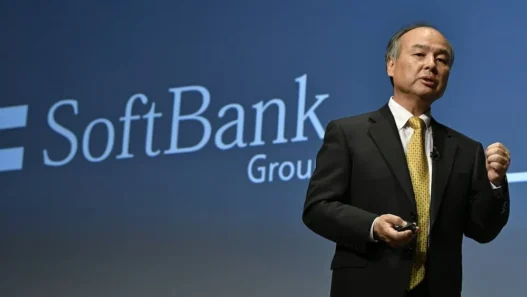The First Big Warning From a Major Asset Manager
The global investment landscape has been dominated for two years by an unprecedented surge in artificial intelligence–related stocks. Chipmakers, hyperscale cloud platforms, model developers, and AI infrastructure companies have seen valuations skyrocket—many doubling or tripling as investors poured money into anything linked to AI compute, data, or software automation.
But now, a growing number of sophisticated investors are sounding the alarm. Among the most prominent is the CEO of Algebris Investments, a major global asset manager known for its contrarian, macro-driven approach. His message:
A “significant” correction is coming for the biggest AI stocks, and markets are dangerously complacent about the risks.
This warning reflects a broader shift in institutional sentiment—one that could reshape how investors view the next phase of the AI boom.
The AI Trade: Too Much, Too Fast?
The AI rally has created enormous concentration in global equity markets. In the U.S., a handful of mega-cap stocks now drive the majority of index gains. These companies have become almost synonymous with the future of technology.
Yet the speed of their rise has triggered concerns:
- Extreme valuations
- Unprecedented capital expenditure cycles
- Slowing revenue growth at the margin
- Investor overreliance on a single theme
- A shrinking pool of buyers at elevated prices
Algebris’ CEO argues that AI expectations have disconnected from near-term economic reality.
Why the CEO Predicts a Major Correction
1. Valuations Have Stretched Beyond Fundamentals
Many AI champions are priced for perfection—exponential revenue growth, stable margins, and years of uninterrupted demand.
But:
- GPU shortages are easing
- Pricing power is weakening
- Competition in AI models is intensifying
- Cloud spending is slowing among major enterprises
When valuations depend on flawless execution, even minor disappointments can trigger large selloffs.
2. The Capex Boom Is Unsustainable
Major AI players are spending at historic levels:
- Hundreds of billions on data centers
- Massive expansion of chip-fabrication capacity
- Aggressive commitments to power generation and cooling
- Large-scale hiring of AI researchers and engineers
Algebris’ CEO warns that these capital cycles cannot grow at this pace indefinitely.
If returns lag behind investment, markets will re-price aggressively.
3. Too Few Stocks Are Driving Market Performance
The global equity bull market increasingly depends on 5–7 names. This level of concentration is dangerous:
- If even one major AI stock disappoints earnings, it can drag the entire market down.
- Algorithms amplify single-stock volatility into broad index moves.
- Passive investors are unknowingly overexposed to the same theme.
This creates systemic vulnerability.
4. Rising Interest Rates and Bond Yields
AI companies rely heavily on future cash-flow projections.
Higher rates compress those valuations.
If bond yields rise further—or if inflation persists—AI stocks become extremely sensitive.
Volatility may return faster than investors expect.
5. The Hype Cycle Is Flattening
The early phase of AI was driven by excitement and expectation.
Now, enterprises are asking harder questions:
- What is the ROI?
- How does AI improve productivity?
- Is this technology indispensable or optional?
- How do we measure real efficiency gains?
Early pilot enthusiasm is giving way to cost-benefit scrutiny.
But Is This the End of the AI Boom? Not at All.
Algebris’ CEO is not anti-AI.
In fact, the firm sees AI as a long-term transformative force comparable to:
- the internet
- cloud computing
- the mobile revolution
But every major technological wave has boom periods followed by sharp corrections:
- Dot-com bubble (1999–2000)
- Cloud stock correction (2014–2016)
- Crypto cycles (2018, 2021)
Corrections are natural—and often healthy.
They erase speculation, force discipline, and allow long-term investors to re-enter at attractive valuations.
What Could Trigger the Pullback?
Algebris highlights several potential catalysts:
1. A Disappointing Earnings Season
If AI-driven revenues fail to justify staggering capex levels, markets will move swiftly.
2. Slower Cloud Spending
Enterprises are cutting costs and delaying deployments.
3. Competition Eroding Margins
Open-source models, new entrants, and smaller startups are attacking profit pools.
4. Chip Supply Normalization
If GPU supply catches up, pricing power for major suppliers falls sharply.
5. Energy Bottlenecks
Data centers require enormous power. Grid shortages could limit AI expansion speed.
6. Regulatory Pressure
Europe, China, and the U.S. are drafting AI regulation frameworks that could slow deployment.
What Investors Should Do: Algebris’ Strategic Playbook
1. Diversify away from mega-cap concentration
Do not rely solely on a handful of AI companies for index performance.
2. Focus on second-tier beneficiaries
These include:
- power companies
- electrical equipment suppliers
- copper and rare-earth producers
- data-center infrastructure firms
- cybersecurity providers
These segments may outperform without excessive valuation risk.
3. Build cash and hedge positions
A correction provides opportunities—liquidity is key.
4. Look at global markets
AI is not only a U.S. story; emerging markets with semiconductor or materials exposure may offer better value.
5. Prepare for volatility
Corrections in mega-caps often spill over into the broader market.
Investors should expect faster rotations and sharper swings.
Conclusion: A Cooling Phase Before the Next Wave?
Algebris’ CEO is essentially delivering a message many investors prefer to ignore:
The AI boom is real, but the AI trade is overheated.
The next phase of the AI era will likely be defined by:
- consolidation
- real productivity metrics
- disciplined capital allocation
- sustainable long-term winners
A correction isn’t the end of AI—it’s the beginning of maturity.
For investors with patience and discipline, that could be the most profitable phase of all.






















